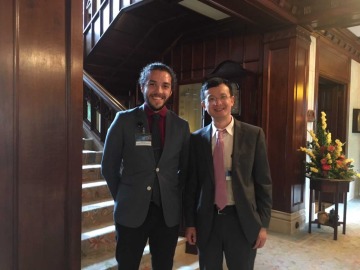
In late May, I packed my bag, got in a plane and landed in the southeast region of Minnesota. I was there to be a summer
undergraduate fellow (SURF) for the Mayo Clinic. My task for the next ten weeks was to begin and conclude a research project and follow that with an oral and poster presentation.
This journey began last year in November when I got the opportunity to participate in the Annual Biomedical Research Conference for Minority Students (ABRCMS)—a national research conference for underrepresented students in science. At the conference, I searched for a summer program that would best build me into a training immunologist. There were hundreds of booths to see, but finally, towards the end of the day, I had developed a list of my favorites. As I took one final pass, walking the outskirts of the hall and seeing if I missed any programs (or sweet swag), I stumbled on the Mayo Clinic booth. To my surprise, they had a Ph.D. and an accompanying summer research program with an option for researching and learning immunology. The representative graduate student genuinely recommended it. Earlier this year, I applied to the full list of programs and received a handful of rejections and acceptance offers. After looking further into my choices, I considered which program would best aid my development as an immunologist. I ultimately choose the Mayo SURF program offer and soon after began my search for a mentor.
During my first week of the program, I was overwhelmed with a steady stream of events including grand rounds (some call them seminars), introductions to the culture of the Mayo Clinic, socials and journal clubs. All of these were on top of a normal lab day. As SURFs we had a choice on how to organize our days: spend more time in lab or explore what else was happening in the clinic. I got into the habit of attending certain events, especially those that were directed to Immunology SURFs, such as the introductory immunology course and faculty-led discussions.
My aim for the summer was to learn the most I could about immunology and then effectively communicate my project at the end. Throughout the process, I honed some lab techniques, like pipetting and QPCR, learned new techniques and engaged with primary literature because of interest as opposed to necessity. My experience at the Mayo Clinic gave me a stronger confidence to learn and ask questions. I also learned how to interrogate once intimidating scientific papers and systematically discover if they contained relevant information for answering my research question. The focus on teaching and genuine care for personal development set a great foundation for me to develop this confidence. In getting to know the culture behind the Mayo Clinic, I found a deep appreciation for their emphasis on work and life balance, ownership to display underrepresented diversity and unifying goal to lead cutting edge scientific research and medical treatment.
It was an honor to be mentored by Dr. Hu Zeng and the lab he leads. My research was in the exciting field of immunometabolism where it is believed that the metabolism within an immune cell plays a critical instructive role in cell differentiation. Research in this field is a hot topic right now; defining these moments in differentiation could mean understanding why cancer continues to grow, unopposed by the immune system, or why autoimmune diseases occur. My work centered on the question: “how does an enzyme that is heavily involved in fatty acid synthesis regulate the function of an immune cell called the macrophage?” My pursuit of an answer ended up working towards the balance of unsaturated and saturated fatty acids that Stearoyl-CoA desaturase (SCD) mediated—the previously unnamed enzyme—and how that affected the macrophage’s function. This was exciting and unheard of research for me. In fact, at points in the process, I was skeptical it was even an accurate portrayal of what the cells were doing. I thought that the energy pathways I had learned about in Biochemistry had no role outside of energy usage and storage. It turns out the biological set-up is much more complicated. I try to approach science with open hands and a willingness to learn, but this stretched that posture out a little wider. I relished that unsettling yet comforting tremor.
The ten weeks flew by, and I am grateful for just about every hour. After lab, I would hang out with friends that I met or have some refreshing introverted time. Rochester, MN as a city doesn’t have many options for the young and adventurous adult, but there were plenty of restaurants to visit, hikes to experience, board games to play, coffees to note, and opportunities to get to know new people. My experience there shaped me in beneficial ways and developed my character. I grew in patience while learning better to communicate. I found confidence in approaching difficult concepts and communicating my thoughts. I also learned to cherish my friends and work as time would soon move us away. This experience taught and allowed me to practice wisdom that I find high value in to this day.






